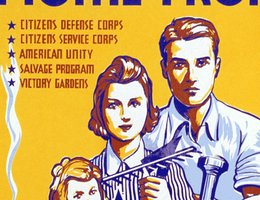

The Japanese attack on Pearl Harbor changed the lives of all Nebraskans. They became united in a common goal of achieving total victory, no matter what the sacrifice. Most Nebraskans did not serve in the armed forces. As civilians, however, they faced many challenges on the home front, and they did their part to help win the war. The Uncle Sam recruiting poster and the events at Pearl Harbor helped motivate a great number of young men to enlist and fight on the front lines.
Nebraskans were told to "get in the scrap", and they did enthusiastically. They were encouraged to buy War Bonds to help finance the effort, and they did. They were told to take jobs and help produce tanks and planes and ammunition. They were told to save and recycle materials. They did. For instance, the Lincoln campfire girls were very proud of the results of their scavenging.

"The Junior Commandos collected scrap of all kinds. My sister and I picked up cigarette packages and gum wrappers all the way home from school each day and separated the tin foil from the paper. We then made a big ball from it. When it became the size of a softball, we turned it into the junk dealer. It had to weigh five pounds before he would take it."
— James Murphy, Columbus Grade school student.
"All I knew when I heard [about] Pearl Harbor that day, I said, ‘Well there goes my wedding in June.’ "
— Marie Curtis, Genoa Rural school teacher.
The war had a great impact on romance. The number of marriage licenses issued in Lancaster County doubled between 1942 and 1943. Unfortunately, many marriages did not last during the war years. Long separations and the threat of death greatly affected people’s lives. The divorce rate soared.